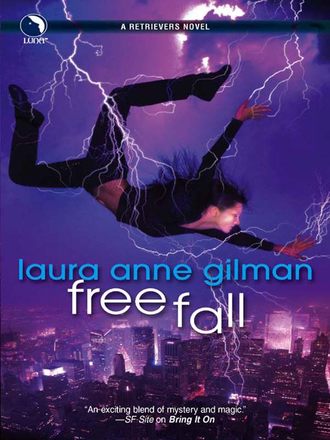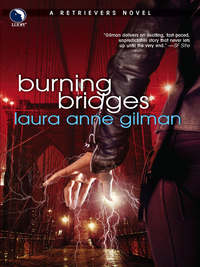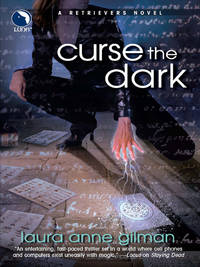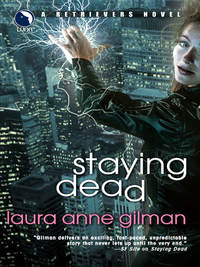
Полная версия
Free Fall
For everyone she could bring in, for that matter. P.B., Danny, and Bonnie, Bart, if she could find him. There were things to be done, and she wasn’t fool enough to think she could do them alone.
She dumped the jacket in the bag, and put it on the chair. She should toss it. There was blood on it, hers, and…other people’s. A dry cleaner might clean it…or they might report it. No way to know. She might be able to get the stains out with current but…
The crumpled bit of paper in her hand crinkled unpleasantly. For an instant, she had the overwhelming urge to brew a pot of tea. She scrunched her eyes shut, conjured the wet fog, and slowly, reluctantly, the urge passed.
Tea meant Sergei. She couldn’t allow herself Sergei, his commonsensical, rational, nonmagical comfort. Not now. Not with everything still messy between them. And this…She looked at the bag on the chair. This was a matter for the Cosa Nostradamus. Nulls need not apply.
four
The atmosphere at Eddy’s was calm, even at the height of the lunch rush. The tables were set with linen so pale blue as to look white, and the floral displays at the front door were placed so perfectly that every table got only an occasional hint of their perfume, so as not to overwhelm the taste or aroma of their excellent, if overpriced food. Conversations were quiet, occasionally intense, and always, as befitted the surroundings, civilized.
Sergei Didier, art connoisseur, boutique gallery owner and trendsetter, former man about the art scene, had spent the past ten years looking for an excuse to eat here. He wasn’t about to waste the experience. But he couldn’t avoid the reason he had finally gotten here, either.
His companion waited until the waiter had finished refilling their glasses and moved away before speaking again. “You’re asking me if I believe in things that go bump in the night.”
Sergei lifted his glass and admired the way the red liquid looked almost brown in the light. It was an excellent vintage, and the aged tannins suited the wild boar on his plate to perfection.
He took a sip, letting the wine slide down his throat with the quiet appreciation it deserved, and then placed the glass on the tablecloth next to his plate. “I am asking if you are willing to admit what you already know.”
The other man at the table raised a white eyebrow at that. “I never admit to anything that will not profit me.”
Sergei knew that. More, he was counting on it. Finding the chinks, the weak spots, within the ranks of his former employer took resources. Some of those resources he already had. Some of them he had to acquire.
Acquiring took delicacy, discretion, and knowing when to bull forward and damn the usual rules. But bull forward carefully. “It is said, in legend and story, that the gratitude of the wee folk was to be valued.”
There was another period of silence as they ate. The business that had, superficially, brought them here was long-finished, the arrangements for a private showing at Sergei’s gallery of this man’s collection all but nailed down in discreet, gentlemanly fashion, waiting only for the lawyers and the insurance companies to agree.
“You’re claiming that there are fairies running around Manhattan?” His dining companion was one of the most famous unknown men in the City. He paid a lot of people a lot of money to make sure that was so. Or rather, his company paid people a lot of money to make it so—and to make sure that nobody disturbed him from his work, which was to determine what the stock market was going to do before the market itself knew.
He was not a man who believed in fairies.
“I am not claiming anything,” Sergei said peaceably, not retreating.
“No. You’re asking me to do so.”
It was an odd conversation held by an odd couple: a seventy-something bald-headed, pug-faced man in a thousand-dollar blue suit and an old-fashioned bow tie, and a forty-something man with a full head of silvering-brown hair and a face perhaps a shade too sharp-lined to be considered handsome. He wore a less expensive but better-fitting suit, and his monochrome tie was perfectly tied, the picture of the confident underling: exactly the picture he wanted his companion to relax into.
The old man wasn’t buying it.
The waiter came by and refilled their wineglasses with silent precision. Sergei let the conversation lapse again: there was nothing to be gained by pushing further, and the meal was worth his full attention.
“I knew a girl once…”
His companion let the sentence trail off, waiting for Sergei to show interest.
“Indeed?” A polite cock of the head, but his attention still on the meal. It was like coaxing a feral cat, like the one that lived out behind his gallery. If you gave them any attention whatsoever, they suspected the worst. Ignore them, and they were intrigued.
“She had claws.”
“Indeed.” Sergei had no idea what breed of Fatae had claws, but he was sure there were at least three different types. Maybe more. Wren might know, if she would ever pick up the damn phone when he called. He shut that thought away. That was personal. This was the job. All his attention had to be on the situation, nowhere else. He could not allow himself to think of anything other than his goal.
The Silence had taught him that, when he was a wet-behind-the-ears college graduate, ready and eager to believe he could help save the world from itself. They had taught him how to concentrate, how to shut out distractions. They had also taught him how to lie, to cheat, and to kill.
And how to betray.
Wren would answer the phone, eventually. Or she wouldn’t. He was the one who had screwed up: he had to wait for her to decide.
“Claws, yes. And eyes that were almost…they were like opals. Dark but filled with color. She wore sunglasses, all the time.”
“And you thought she was human.” He had once thought the entire bipedal world was human; working with Wren Valere had taught him differently. Not even the humans were human, sometimes.
“No. I thought she was a dream. And, like all dreams, eventually I woke up. And she was gone.”
The man was seventy-four, and for a moment his voice was that of a man in his twenties.
Sergei could relate. Magic did that to you. But what he was doing here had nothing to do with Wren for the duration. Not in that way, anyway. The Cosa Nostradamus might not want him, either, but they needed him. Needed his contacts, his skills. His ability to get past the front guard of the Silence, even now. Especially now.
Andre Felhim, his former boss, was still inside, fighting to reclaim the organization from the corruption eating it from the top down, the force that had turned it from benefactor of the innocent to persecutor of the different. Sergei didn’t think that the old man had a chance in hell, but hell had been known to throw some wild dice.
In the meanwhile, Sergei stood just inside the door and tested the foundation for weaknesses. A way for the Cosa to defend themselves, come the next attack. Because it would come, there was no doubt of that.
“You never tried to find her again?” he asked his companion.
“Of course I did. But after a while…You let dreams go. Or you go insane trying to convince others that it was real.”
They ate in silence. When the waiter came to take their plates, Sergei’s host raised weary eyes to him. “They are real.”
Sergei nodded. The knowledge did not seem to bring the older man any peace.
“What do you want me to do?”
Sergei’s next meeting didn’t go quite as well.
“No.” Flat, unbending, and final.
“Joanie…” He tried for a reasonable tone.
“No.” She kept walking, looking straight ahead; no sideways-slanting glance that might give him hope. She had a black leather pocketbook slung over one arm, and black leather sneakers on her feet. He had caught her on her lunch break, taking a power walk.
“Joanie.” He kept pace with her, letting a hint of calculated wheedling slide into his voice, just enough to make her laugh and give in, once upon a time.
“I hate you.”
“You always did.”
Her mouth twisted, and she glared at him. Joanie was tall, and blond, and had a chest that just asked for a deep breath and a low-cut neckline. But the way she glared made her cousin to Wren in attitude, if not looks.
Don’t think about her. Don’t go there now. Damn it, focus!
They were walking along a glass-enclosed arcade, under artificial lights replicating sunlight. The stores lining the walkway were trying very hard to look expensive and exclusive, and the women walking in and out of them, bags in hand, were doing likewise. He had just come from his lunch, with the results of it tucked securely away by means of one phone call to a very discreet private bank, and an electronic transfer to another account set up within the same bank. Sergei felt a little dirty about it all, but that wouldn’t stop him from using every penny, and going back to ask for more, if needed.
“I can pay for information.”
“You think I’m holding out for money?” Her voice went from reluctant to honestly annoyed.
Nobody who worked for the Silence ever needed to take a second job, even if they had the time or energy for it. “No.” He didn’t think that. “But it will make…whatever happens, easier.”
He had no idea what was going to happen, but playing on someone’s fears of the future was usually effective. He’d learned that from his tax guy.
Joanie shook her head, blond ponytail wagging. “Nothing’s going to happen. You’re wrong.”
“I’m not wrong.” He paused. “Joanie. I was there. I saw what I saw.”
She didn’t bother arguing that point. “You never killed for the cause?”
He had. He had, more than once. “I never killed an innocent. I never killed one of our own.”
Poul Jorgunmunder had. Poul, Andre’s protégé, his replacement once Sergei left the Silence.
And the innocent he had killed was Bren, Andre’s left-hand woman. A good woman, as far as Sergei knew. Poul had killed her in cold blood, in order to implicate the Fatae in the murder of a Silence employee, setting a trail of clues that would have fired up anti-Fatae sentiment even higher, caused even more deaths.
Sergei had seen it happen. So had Andre. Only one of them had been horrified.
“I was an Operative for ten years,” Joanne said. “I worked with Poul, when he first came on-board. Smart kid. Sharp. Everyone knew he was going places.”
“Yeah,” Sergei agreed, tasting something sour in his mouth that wasn’t from lunch. He had never liked Poul, but he had trusted Andre’s judgment on the man. They had both been wrong. “He went places…right to Duncan’s side.”
She looked puzzled. It seemed honest. She didn’t know. She wasn’t part of it.
He had picked right. Sergei allowed himself a faint breath of relief.
“The Silence, they’re using the FocAs, Joanne. Our kids. They’re using them as weapons. Against their own kind. Against innocents.”
FocAs. That was Silence shorthand for Focused Active Agents. Talented Operatives, brought in by the Silence—by specific Handlers like Joanne and, once upon a time, Sergei, to work on very specialized situations—using magic to fight magical threats. Most of them were low-res, to use Wren’s term. Not Pures, not extremely strong, but still Talent. Young. Hell, most of them were children, in all the ways that mattered. Most of them had been under twenty when they signed on.
The Silence was twisting them. Brainwashing them somehow. Using them against the Cosa, and then throwing them away.
They had been the greatest victims of the Bridge, killed by their own kith and kin in self-defense.
The more of this he told Joanie, in just a step more detail than he estimated she could stand, the greener her pale skin became, until she tuned away and was sick in a potted plant outside one of the stores. He watched, feeling only a little guilt. He did what he needed to do, to get the results he needed.
A salesgirl glared at them, but made no effort to come out and either help, or chase them away.
When Joanie finished, he took her by the arm, and walked her to the nearest public rest room. He waited outside while she washed her face and flushed out her mouth. His point had been made; there was no need to punish her further.
When she came out, her skin was still pale and green-tinged, but the control that marked a good Operative was back in place. She opened her mouth, and the party line fell out. “We do good work. The means aren’t always just, but…”
He wished he was more surprised at her words. “Is that justification for murder, fraud, and setting up more innocents to die?”
“Are they innocent?” she asked. “Are any of us really innocent? Bren…I never met her. But she was a member of the Silence. To protect the innocent is our reason for existing. That means we take on the onus of not being innocent. We see too much. We know too much. Sometimes, we do too much. That’s the cost.”
It wasn’t, Sergei reflected sadly, only the FocAs who were brainwashed. He had been there once, too. It had taken a case going horribly wrong before he had found the strength to walk away, and only Wren had kept him from going back.
What would it take to get Joanie to walk away?
“Are you willing to wake up at three in the morning, knowing what cost you’ve paid out of your soul, if you sit and do nothing, now?”
She looked away, watching the progress of a pair of young women down the escalator below them. “I’m awake at three in the morning anyway, Sergei. Aren’t you?”
Once, he would have been silent. Now, he had an answer for her.
“No. I’m not.” It sounded priggish, but it was also the truth. “I don’t wake up and stare at the ceiling, or listen to the clock tick. I go to bed, and I sleep through the night, now.”
And with that small white lie, he walked away, hoping that what he had said had been enough to seed doubt, that even if she would not question her loyalties, she would not turn around and betray him.
He didn’t look back, but he felt her staring at him.
Three hours later, sitting in an office in another part of town, surrounded by exotic woods carved into seductive and somewhat disturbing forms, his cell phone rang.
“I’m sorry, if you’ll excuse me for a moment?” he asked the man he was speaking with. Taking the nod as permission, Sergei walked a few steps away and flipped open the phone. “Didier.”
“Maxwell’s Tea House. 4:00 p.m.”
The connection broke off, and Sergei pocketed his phone with a thoughtful frown. He hadn’t recognized the voice, or the number on the display. Not that those facts alone meant anything, good or ill. His phone number got around, and he had been sowing the ground pretty intensely over the past few months since the fiasco downtown. But he would have been slightly more comfortable if he knew which tug on what rope had produced that invitation.
Maxwell’s was, if he remembered correctly, not particularly in one group’s territory or another, and he had never met anyone there before. In fact, the only reason he knew about it at all was that Shig, the Japanese Fatae friend of P.B.’s, had mentioned it as having a particularly authentic tea ceremony. And that it was a good place to hold delicate discussions.
So it could be an honest meet. Or a setup. Or both.
It could be anything. So why did he feel a nervous chill in his bones?
Because he knew too well what all the players were capable of. And he had no backup.
“I’m sorry.” He went back to the man he had been speaking with, who was waiting patiently. “I’m afraid I am a man in demand, today.” The other man, an art dealer from New Zealand, accepted the comment as it was offered, with a smile, and they continued their negotiations.
Even in wartime, business continued.
five
The building that housed the Silence elite was a discreet brick structure on a street of similarly discreet structures, all dating back to when the island was known as New Amsterdam, not Manhattan. The original Board had met here, at the turn of the previous century, laying the groundwork for what would become the multinational, multimillion-dollar foundation known as the Silence, and some said that their ghosts still lingered in the hallways and boardrooms, watching and judging what their heirs did with their inheritance.
For all that history, the building was completely nondescript the way only the very wealthy and the very confident can afford to be. To walk down this street, under trees almost as old as the buildings, it would be difficult to guess who lived and worked here. The only identifying marks on the rows of buildings appeared on small plaques with the years of their founding engraved on it, and a well-placed buzzer to call for admittance.
The Silence’s building, number 27, did not have even that. You either knew, or you walked on by without a second thought. It wasn’t magic that kept them unnoticed, but practical camouflage. This building is exactly like all the others. This is not the building you thought that you were looking for.
And if it was the building you thought you were looking for? The Silence had security for that, some nonlethal, some very lethal, and all perfectly legal.
But some unwanted visitors were more persistent than others. And they didn’t need to ring the buzzer to gain entry.
“Seven,” Christina was saying. When she had first joined the Silence as an Operative they had called her Tina. By the time she made Handler two years later, she was Christina. To most of the rank and file, she was now ma’am. “Seven times our security has been compromised.” She didn’t mention how many attempts had been made that failed, and nobody asked. A failed attempt was part and parcel of the job, and not worthy of comment.
The man at the head of the table nodded thoughtfully. “Seven attributed to the same source?”
“At least four of the seven, likely closer to six.” It was probably all seven, but she could not confirm that.
“Has there been any actual penetration?”
“No, sir. Each time we were able to reroute our protections and deny entrance.” If it had been otherwise, heads would already have rolled. “But they are learning our patterns, and there is only so far we are able to alter them without compromising ourselves in the effort.”
Andre Felhim listened, not to what Christina was saying—he already knew, having used his still not inconsiderable resources within the organization to get his hands on and read the report before it went to Duncan. He listened now to what was being said by the rest of the people in the room: not voices, but bodies. Too many people were surprised by the fact that there had been any incursions on their security system; that news should have spread within three hours of the first attack. The Silence’s main currency had always been information, both within and without, and the more you held the more power you had.
At this level, in this room, new information should have been blood in the water, and yet there had been no frenzy, no desire to know, to acquire the details, and dig—or, if you had enough status, have someone else dig—for more.
Some might say that was the sign of a well-trained team, focused on their task.
Duncan did not have a team. He had a cadre. Zealots. True Believers, who saw no need to know anything beyond what the Man Himself needed them to know to accomplish their goals.
Andre had seen terrible things in his thirty-plus years with the Silence. He had done terrible things, and allowed terrible things be done to others, all the while believing in their call to arms: to defend the innocent and the unknowing against the things in the world that would prey upon them. He believed, wholeheartedly, in the mission.
The people in this room terrified him.
“How long will it take to implement and install a new system to underlay the original?” Duncan asked as though he expected the answer to be “it was done yesterday.”
Christina hesitated, and looked to her left, where her group members sat. “We should have the underlay in place within four days. It has yet to be tested, however.”
The room went still.
Duncan considered the words, and Andre considered Duncan, carefully, observing their leader no more and no less obviously than anyone else in the room. His lean and angular form, draped in a suit of very expensive, quietly classic cut and fabric, gave nothing away. Duncan was a natural mute when it came to body language. It was part of what made him so dangerous.
“You can test it without disrupting the original security?” he asked Christina after due consideration, just long enough to make her sweat.
“Yes, sir.”
“Then get it in place and run the tests.” He dismissed her almost casually, to imply his greatest faith in her ability to perform perfectly, and she fell back into her seat with the expression of a woman who had been kissed by the gods. That was the other part of what made Duncan a real and present danger: charisma. “What’s next?”
“Sir.” A solidly built Asian man stood, formally waiting to be recognized. “If I may?”
“Please.” Their leader oozed both charisma, and a disarming grace of manners. Duncan had not gained any of his power by being rude, even the politely confrontational manner of the new speaker’s posture did not trigger anything but graciousness in him.
“This intrusion, it is the work of these so-called Talent?”
There was a burst of nervous laughter, quickly stifled, from someone sitting in the row of straight-backed chairs lining the far wall of the conference room. A junior, someone’s assistant, who would catch hell later for that.
Duncan almost reacted, leaning forward to deliver a rebuke. “There is no so-called about it, Reese. They are quite definitely talented, and should not be underestimated. I believe that the events of last January should have brought that home to everyone in this room?”
There were nods around the room. Not that any of them had been there; shock troops had died on the Bridge, not these privileged officers. None of them had been on the front lines…none of them save Andre, and Duncan himself.
And Duncan’s hand-picked lieutenants, including Poul Jorgunmunder, who had once been Andre’s own protégé/right-hand man.
Poul was no longer with them, dead at Andre’s own hand. Dead, after he had first killed one of their own, his former teammate Bren, Andre’s left-hand woman and trusted aide d’office.
It had been a bad day at the bridge, that cold winter morning. Bad all around.
Andre wondered briefly what cold hell Poul was populating now, and then gave his attention back to Reese, who was still speaking.
“Sir, why have we not struck back at them? We know where they are, we know who they are. What is to stop us from simply making them…”
“Disappear?” Duncan asked, his voice dangerously soft and inviting.
“Sir. Yes, sir.” Reese was cautious, but he did not back down.
Duncan looked at him, and then looked across the room at the rest, some thirty bodies all eager to prove themselves, to please their master. “Andre.”
“Sir?” Oh, it grated on him to say that, and Duncan knew it grated, damn him.
“Would you be willing to make a Talent…disappear?”
“Not alone, sir. I know firsthand what they are capable of.” Maybe half of the people sitting in this room had started out in Ops, the active field unit Andre had worked with for twenty of his thirty years with the organization. Maybe ten people in this room had ever been Handlers, had ever directed an Operative. None of them had ever worked with a FocAs, a Talented Operative. The Handlers who were assigned FocAs did not go to Duncan.
Andre knew for a fact, thanks to his researcher, Darcy, that most of the Handlers who worked with Talented Operatives were either dead or in “rehab” now, recovering from reported emotional breakdowns. A comfortable, secluded rehab, on the Silence’s tab, of course.






